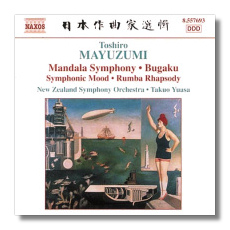
The Internet's Premier Classical Music Source
Related Links
- Latest Reviews
- More Reviews
-
By Composer
-
Collections
DVD & Blu-ray
Books
Concert Reviews
Articles/Interviews
Software
Audio
Search Amazon
Recommended Links
Site News
 CD Review
CD Review
Toshiro Mayuzumi

- Symphonic Mood
- Bugaku
- Mandala Symphony
- Rumba Rhapsody
New Zealand Symphony Orchestra/Takuo Yuasa
Naxos 8.557693 DDD 68:20
Next to Tōru Takemitsu, Toshiro Mayuzumi (1929-1997) probably is Japan's most famous classical composer. This disc is a good overview of some of his most important orchestral music, aside from the Nirvana Symphony, an intriguing combination of Buddhist chanting and diverse classical influences from the West.
After having shown manifold musical talents at an early age, during World War Two Mayuzumi entered the Tokyo Music School where his first mentor was Qunihico Hashimoto. Hashimoto instilled an appreciation for Debussy, Ravel, and Stravinsky in the young composer. After the war, Hashimoto was forced to step down, and Mayuzumi continued his studies with Akira Ifukube (whose convulsive and violently driving works betrayed his fascination with Le sacre du printemps) and Tomojiro Ikenouchi (who was influenced by the French musical scene earlier in the century). All in all, Mayuzumi received a broad-based and practical education in Tokyo. This would serve him well, because after the war, Japan's weak economy compelled him to play the piano in jazz bands in order to make ends meet. In the 1950s, additional studies in France introduced him to musique concrète. By 1958, the year of the year of the Nirvana Symphony, Mayuzumi had more tools in his kit than many composers ever acquire, and he was not even 30!
The earliest work on this CD is the Rumba Rhapsody, composed in 1948 and never recorded until now. During wartime and for a short period after, American jazz was banned from Japan, and Latin-American music briefly took its place. The composer's exposure to this music was undoubtedly the inspiration behind the Rumba Rhapsody. Unlike Ravel's La valse (for example) or Piazzolla's tangos nuevos, it doesn't dig deeply into the dance genre, and the result is attractive but rather innocuous. Mayuzumi reused bits of the Rumba Rhapsody in the Symphonic Mood, which was completed in 1950. (This is its first recording as well.) The composer said that it was his intention to express nostalgia in the Symphonic Mood, although the lively second part sounds anything but nostalgic. In fact, parts of Symphonic Mood sound like they might have been written by Aaron Copland!
The Mandala Symphony is in two movements, and like the Nirvana Symphony, reflects the composer's interest in Buddhism. A mandala is a two- or three-dimensional representation – emphasizing wholeness and continuity – of the universe. Unsurprisingly, Mayuzumi's music takes on a more ritualistic quality here. Mankind's aspirations towards enlightenment and true Buddha-nature are represented by the themes used by the composer, as is its mirror image: Buddha's stepwise descent to Earth to teach Mankind the way to attain Buddha-nature.
Most ritualistic of all is Bugaku, a ballet in two parts written in 1962. "Gagaku" refers to the type of "refined" music used in Japanese courts, and "Bugaku" is a type of Gagaku used in dancing. Traditional Bugaku dance uses symmetrical movements and is accompanied by wind instruments and percussion. Of all the works on this CD it is in this one that Messiaen's influence can be felt most strongly.
These performances sound excellent and Naxos' engineering is just fine. The booklet notes include a good essay about the composer. The label's series of Japanese classical music goes from strength to strength, and I hope it won't be long until they turn to works by Saburo Moroi, a composer from the generation before Mayuzumi who was influenced by Franck and the German romantics.
Copyright © 2006, Raymond Tuttle




















